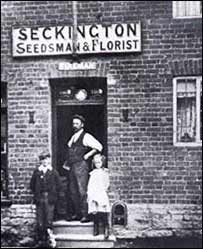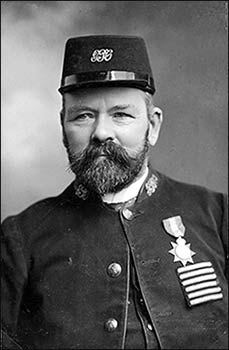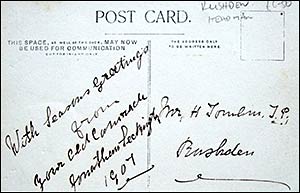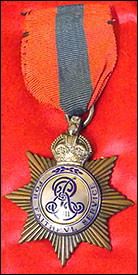|
|
|||||||||
| Article taken from The Rushden Echo 21st June 1907 transcribed by Gill Hollis |
|||||||||
|
AN OLD SERVANT OF RUSHDEN A CHAT WITH MR. J. SECKINGTON |
|||||||||
|
RUSHDEN POSTAL AFFAIRS : THIRTY YEARS AGO AND NOW : INTERESTING REMINISCENCES
|
|||||||||
|
|
|||||||||
“I commenced my duty,” Mr. Seckington said, “at Higham Ferrers post-office on March 2, 1873 – thirty-four years ago – as rural postman for Rushden and Wymington. At that time I had to deliver the whole of the letters in Rushden and Wymington twice a day. The only streets in Rushden in 1873 were High-street, Duke-street, Church-lane (now called Newton-road and Church-lane), and Little-street. On the Back-way, now known as Rectory-road and Park-road, THE ONLY HOUSES were Margetts’ Cottages, at the top of Drawbridge’s yard, the Rectory, and six cottages in what is now called Park-road. The only yards were Sargent’s-yard (now called Beaconsfield-place), Denton’s-yard (now called Woburn-place), the Orchard, Jaques’-yard (now Milton-place), Drawbridge’s-yard (now Succoth-place), and there were two cottages adjoining the Old Malting, where the Coffee Tavern now stands. Then there was Albion–place in High-street south, and a few cottages at the back of the factory occupied by Mr. Arthur Willmott. There were only two houses on the Wellingborough-road – Blowswick Farm, now occupied by Mr. George Wilmott, and the house adjoining the Windmill, and these houses were outside the radius of delivery. At that time it was one of the postal regulations that if a house was over 70 yards from the street it was not included in the delivery.” “What did people do under such circumstances?” asked the “Echo” scribe. “They had to fetch their letters,” said Mr. Seckington, “or they could appoint a place where the letters might be left – generally THE NEAREST NEIGHBOUR. Compare with that the present arrangements. In these days letters are delivered at least twice a week even to the most far-away lodges in any part of the country. Coming back to Wellingborough-road, there certainly was a roadway at that time, but it was a very poor one, not like the splendid road we have to-day. When I first started postal work, the late Mr. John Groome was the postmaster at Higham Ferrers and Mr. Charles Hewitt at Rushden. Higham Ferrers was then a head-office, Rushden being subordinate to it, but both Higham and Rushden are now sub-offices to Wellingboro’. “Then there was a great difference as to punctuality in the arrival of the mails then and now. We used to receive a portion by rail and a portion by road. The letters by rail were due in at 5 a.m. at Higham Ferrers and the road mail at 6 a.m. The letters by rail would come by goods train from Northampton, and if there was much traffic at Northampton the mails would be very late. There used to be a good deal of grumbling both at Higham and Rushden, over THE LATE ARRIVAL of the letters.
“Shortly after that, frequent complaints used to be made regarding the irregularity of the mails, and the postal authorities were petitioned to make better arrangements. At this time – it would be in the early ‘Eighties – the town of Rushden began to grow by leaps and bounds. When I started postal work, practically the only boot manufacturers in Rushden were Mr. John Cave, Messrs. B. Denton and Son, Mr. Wm. Claridge, and Mr. Wm. Colson. The only bit of real pavement in Rushden at that time was in High-street, opposite Mr. Denton’s shop, there being some old stone flags at that spot. In other parts of the street there would be a few pebbles here and there – we used to call them ‘PETRIFIED KIDNEYS’ - and there were a few lime-stone slabs stuck up to show where the ‘pavement’ ended and the road began. It was nothing but mud and dirt paving. “Another thing. When I started letter carrying there were two toll-gates at Higham Ferrers just as you go into Higham from Rushden. One gate was across the road leading from Rushden into Higham, and the other was close to it, across the road to Wellingborough.” “What time did you start on your journeys?” queried our representative. “I use to leave Higham at 6 a.m.” Mr. Seckington replied, “and after delivering the letters in Rushden I had to go on to Wymington, getting there about nine o’clock. I used to return at ten, and then I had the same journey to do again at mid-day. Rushden kept growing, and then I had to be relieved of one of the Wymington journeys. Afterwards the other delivery at Wymington was taken from me and I had to devote all my time to Rushden. Still RUSHDEN KEPT INCREASING and I had one man to help me, then two, then three, afterwards four, after that six. The number of letters I used to deliver each day in Rushden and Wymington when I first started would not equal the number I afterwards had to deliver in one of the six divisions into which Rushden was subsequently separated. “Rushden’s postal arrangements to-day are splendid. There is the magnificent post-office; you have a post-master and an indoor staff of five clerks, including two lady clerks; you have four established postmen, and six auxiliaries (men delivering letters in the morning), two men for delivering parcels, and three telegraph messengers. That reminds me that when I started there was no telegraph office at Rushden. All telegrams for Rushden had to be brought over from Higham. “Rushden has now three deliveries a day and twelve despatches – you give a list of them in the Echo. There are four sub-offices – Higham-road, High-street South, Newton-road, and Wellingborough-road – and quite a lot of wall-boxes and pillar-boxes. Your list in the Echo shows them all.” “You have seen some wonderful changes in your time,” said the Echo interviewer. “I have indeed,” Mr. Seckington replied. “There are not, at the very most, more than two or three householders in Rushden to-day living in the same houses as when I commenced my postal duties 34 years ago. As you know, there was NO RAILWAY INTO RUSHDEN at that time. The Coach and Horses was a licensed house then, though the coaches had ceased to run. From a muddy village, Rushden has grown into a prosperous town. Among the new buildings erected during my post-office career, there are three banks (the nearest bank previously being at Wellingborough), the Police Station, the Fire Station, the Council buildings, the Free Library, the new Post Office, the Coffee Tavern, and the up-to-date gasworks; there are the alms-houses on the Wellingborough-road, built to the memory of Mr. Maitland Sartoris; new schools have been built in Newton-road, Moor-road, and Hayway; the new brick works; the Independent Wesleyan, Park-road Baptist, Park-road Wesleyan, Primitive Methodist and Zion Chapels, St. Peter’s Church, and the Wellingborough-road Mission; the Conservative, Working Men’s, Town Band, Windmill, Trade Union, and Athletic Clubs. The population of Rushden in 1873 was about 3,000; now it is 14,000. “The old thatched houses in Rushden used to be very low, and hundreds of times I have handed people their letters through the bedroom windows, which I could easily reach. When delivering letters in Duke-street I have many a time had to wade through the water, as people used to throw all sorts of things into the brook, so that the water could not run away. Now you have a town of first-class streets, well made roads, and splendid pavements. “I had the pleasure of delivering THE FIRST PARCEL which came in by parcel post from abroad. It was from my brother, who was in India at the time, and it was addressed to me, so that I had to deliver it to myself. It was a parcel containing a collection of curios. “It might be interesting to note that Mr. and Mrs. Charles Hewitt used to manage the post-office at Rushden, and that when I started the post-office was on the premises now occupied by Mr. Tomlinson, tailor.” It is a pleasure to us to state that Mr. Seckington leaves the service with six good-conduct stripes – the highest possible number. The high regard in which he is held by his colleagues is shown by the fact that every member of staff subscribed to the presentation reported in this week’s “Echo.” Mr. Seckington is the first established postman of Rushden to retire on a pension. He was very anxious to serve two more years if he had been able, and then he would have reached the age of 60 when he could have claimed the full pension, but unfortunately he has become medically disqualified. He will have the heartiest wishes of his fellow townsmen, by whom he is deeply respected, for a long and happy period of retirement. ------------------------- PLEASING PRESENTATION AT RUSHDEN RETIREMENT OF MR. J. SECKINGTON AFTER 34 YEARS’ SERVICE
Mr. Field, the postmaster, in making the presentation, said he was pleased to be able to say, and Mr. Seckington would be proud to hear, that every member of the staff, from himself to the youngest telegraph boy, had joined in the subscription. They were all sorry he was going before his allotted time, more particularly in the circumstances, but they hoped he would soon fully recover. He had set a sterling example of strict attention to duty, and had also gained their RESPECT AND ESTEEM by his unvarying geniality. Mr. J. T. Lovell, who succeeds Mr. Seckington as senior postman, expressed himself unable to add much to the Postmaster’s remarks, but hoped that Mr. Seckington would live long to enjoy his pension, which had been well earned. Mr. Seckington, who was so affected as to be unable to reply for some time, deeply thanked the staff for their kind present, and their kinder words. He had always taken a delight in his work, when in good health, and he was sorry to leave them. They had got a good staff and a handsome office, and he hoped they would go on and prosper. He and his wife, and his children after them, would value the gift they had made him that night, and he trusted they would all have a good cup of tea out of it. During the evening many songs were well rendered by Messrs. Field, Baker, Hall, Freeman, Marsden, and Stokes. Mr. H.C. Lovell accompanying at the piano, and altogether a most enjoyable time was spent. |
|||||||||
Post Office - Mainpage |
|||||||||



